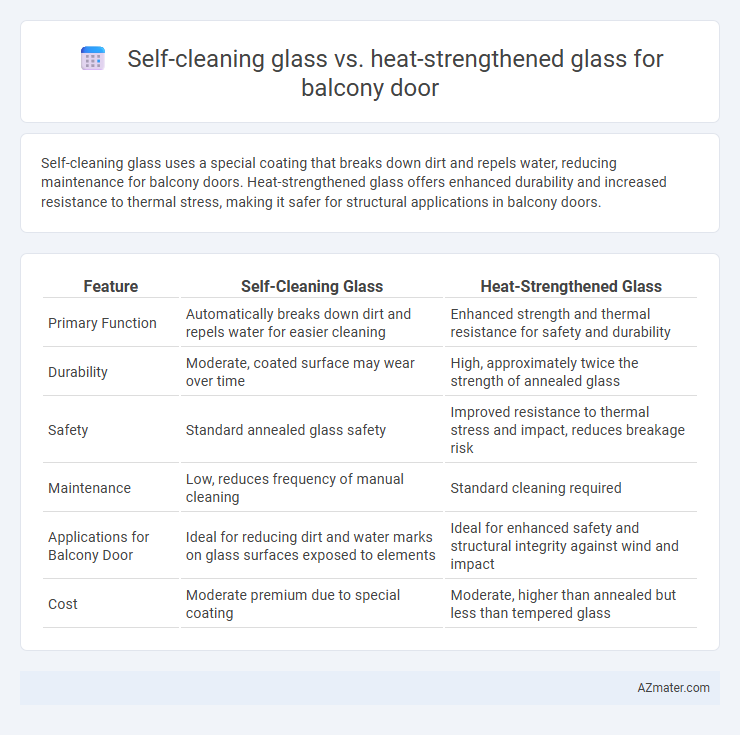Self-cleaning glass uses a special coating that breaks down dirt and repels water, reducing maintenance for balcony doors. Heat-strengthened glass offers enhanced durability and increased resistance to thermal stress, making it safer for structural applications in balcony doors.
Table of Comparison
| Feature | Self-Cleaning Glass | Heat-Strengthened Glass |
|---|---|---|
| Primary Function | Automatically breaks down dirt and repels water for easier cleaning | Enhanced strength and thermal resistance for safety and durability |
| Durability | Moderate, coated surface may wear over time | High, approximately twice the strength of annealed glass |
| Safety | Standard annealed glass safety | Improved resistance to thermal stress and impact, reduces breakage risk |
| Maintenance | Low, reduces frequency of manual cleaning | Standard cleaning required |
| Applications for Balcony Door | Ideal for reducing dirt and water marks on glass surfaces exposed to elements | Ideal for enhanced safety and structural integrity against wind and impact |
| Cost | Moderate premium due to special coating | Moderate, higher than annealed but less than tempered glass |
Introduction to Balcony Door Glass Options
Balcony door glass options include self-cleaning glass and heat-strengthened glass, each offering distinct benefits for safety and maintenance. Self-cleaning glass incorporates a special coating that decomposes organic dirt and washes it away with rain, reducing cleaning frequency. Heat-strengthened glass undergoes controlled thermal treatment, enhancing its strength and resistance to thermal stress, making it safer and more durable for balcony doors exposed to weather variations.
What Is Self-Cleaning Glass?
Self-cleaning glass features a special photocatalytic and hydrophilic coating that breaks down organic dirt and allows water to sheet off, minimizing the need for manual cleaning. This innovative glass type uses sunlight to activate the coating, ensuring continuous maintenance and clarity, making it especially practical for balcony doors exposed to outdoor elements. Unlike heat-strengthened glass, which is designed primarily for enhanced strength and thermal resistance, self-cleaning glass prioritizes low maintenance and clear visibility.
Understanding Heat-Strengthened Glass
Heat-strengthened glass for balcony doors offers enhanced durability compared to standard glass, providing approximately twice the strength to withstand impacts and thermal stress. Unlike self-cleaning glass designed with a special coating to break down dirt using sunlight and rain, heat-strengthened glass improves safety by resisting breakage and reducing the risk of shattering under moderate impact. This type of glass ensures more reliable structural integrity for balcony doors exposed to varying weather conditions and potential mechanical forces.
Key Differences: Self-Cleaning vs Heat-Strengthened Glass
Self-cleaning glass for balcony doors features a special coating that breaks down organic dirt using sunlight and allows rainwater to wash it away, reducing maintenance efforts. Heat-strengthened glass, on the other hand, undergoes a thermal treatment process to increase its strength to approximately twice that of annealed glass, enhancing safety and resistance to thermal stress. While self-cleaning glass prioritizes low-maintenance and clarity, heat-strengthened glass offers improved durability and structural integrity.
Durability and Strength Comparison
Self-cleaning glass features a titanium dioxide coating that breaks down dirt and repels water, maintaining clarity with minimal maintenance, whereas heat-strengthened glass undergoes thermal treatment to increase its strength to about twice that of standard annealed glass. In terms of durability, heat-strengthened glass offers superior resistance to impact and thermal stress, making it less prone to breakage under pressure or sudden temperature changes, which is critical for balcony doors exposed to outdoor conditions. While self-cleaning glass enhances convenience and cleanliness, heat-strengthened glass provides enhanced safety and structural integrity, making it the preferred choice for durability and strength in balcony door applications.
Maintenance Needs and Cleaning Requirements
Self-cleaning glass reduces maintenance needs by using a titanium dioxide coating that breaks down organic dirt and allows rainwater to wash it away, significantly minimizing manual cleaning efforts for balcony doors. Heat-strengthened glass, while offering enhanced strength and thermal resistance compared to regular annealed glass, requires regular cleaning similar to standard glass to prevent dirt buildup and maintain clarity. Choosing self-cleaning glass for balcony doors can lead to lower cleaning frequency and long-term maintenance savings compared to heat-strengthened glass.
Energy Efficiency and UV Protection
Self-cleaning glass for balcony doors enhances energy efficiency by reducing the need for frequent cleaning and maintaining optimal thermal insulation with its low-emissivity coatings. Heat-strengthened glass offers superior thermal resistance and improved UV protection, minimizing heat transfer and safeguarding interior furnishings from harmful ultraviolet rays. Choosing between the two depends on balancing maintenance convenience with specific energy-saving and UV-blocking requirements for balcony door applications.
Aesthetic Appeal and Clarity
Self-cleaning glass for balcony doors enhances aesthetic appeal by maintaining a consistently clean, clear surface with minimal maintenance, utilizing a special coating that breaks down organic dirt under sunlight. Heat-strengthened glass offers improved clarity and strength compared to regular annealed glass but lacks the self-cleaning properties, requiring regular cleaning to preserve its visual quality. The choice depends on prioritizing low maintenance with long-term clarity versus enhanced strength with standard cleaning requirements.
Cost Analysis and Long-Term Value
Self-cleaning glass for balcony doors typically incurs higher upfront costs due to advanced coatings that repel dirt and reduce cleaning frequency, offering long-term value through maintenance savings. Heat-strengthened glass, while more affordable initially, provides enhanced durability and safety without self-cleaning properties, potentially increasing maintenance efforts and costs over time. Evaluating the cost-benefit ratio involves balancing initial investment against reduced cleaning expenses and durability, where self-cleaning glass may yield greater value in hard-to-reach balcony installations.
Choosing the Best Glass for Your Balcony Door
Self-cleaning glass for balcony doors reduces maintenance by utilizing a special coating that breaks down dirt and allows rainwater to wash it away, providing clearer views with less effort. Heat-strengthened glass offers superior strength and safety, being more resistant to thermal stress and impact compared to regular glass, making it ideal for areas exposed to harsh weather. Choosing the best glass depends on balancing the need for low maintenance with durability, where self-cleaning glass excels in convenience and heat-strengthened glass ensures enhanced safety and longevity.

Infographic: Self-cleaning glass vs Heat-strengthened glass for Balcony door
 azmater.com
azmater.com